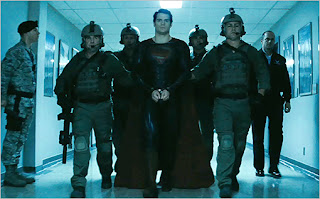New Superman, Familiar Themes
"My father believed that if the world found out who I really was, they'd reject me... out of fear. He was convinced that the world wasn't ready. What do you think?" — Clark Kent, "Man of Steel"
Since his birth in 1936, Superman has been the most deistic superhero. It makes sense given his origin. Superman was birthed by two Jews living in Cleveland during the Great Depression. Early in his life, Superman was something of a moral paragone and a social crusader. Arguably, over time, he's come to represent much more.
Doubtless the makers of "Man of Steel" — the latest incarnation of Superman — see him as something of a Secular Messiah, as so many have since the 1960s. They certainly seem to be playing up the close association with The Savior, Jesus Christ. Consider Clark's statement quoted above. If the world found out who he really was they'd reject him. Sounds an awful lot like what happened to Jesus, who performed divine miracles, preached a different approach to life, and earned the wrath of the leaders of the time who feared and failed to appreciate him.
Throughout "Man of Steel" Clark Kent or Superman is portrayed as a beacon of hope; a light in a dark world. Consider what his father, Jor-El, says of his mission: "You will give the people an ideal to strive towards. They will race behind you, they will stumble, they will fall. But in time, they will join you in the sun. In time, you will help them accomplish wonders."
But Jor-El isn't the only one to recognize something special in Clark. His earthly father, Jonathan Kent, sees something similar. He tells Clark, "You're not just anyone. One day, you're going to have to make a choice. You have to decide what kind of man you want to grow up to be. Whoever that man is, good character or bad, it's going to change the world."
Of course, at 33, Clark decides to own who he is, reveal himself to the world, and do just that — bring hope to the people. At least that is what the film would have you believe. My concern is that he doesn't really accomplish that. There is little about the way Superman conducts himself in battling General Zod that would help him be that light. He doesn't preach to the world, he doesn't really talk to the world. He simply fights an enemy that's seeking him out.
And in the process he nearly destroys two cities — Smallville and Metropolis. So it remains to be seen, likely in future installments, how this salvation and guidance of mankind will play out.
But like so many recent incarnations of the story, this one makes Superman out to be more than a superhero. He is a symbol, a hope, and a savior. Just not the real one.




Comments
Post a Comment